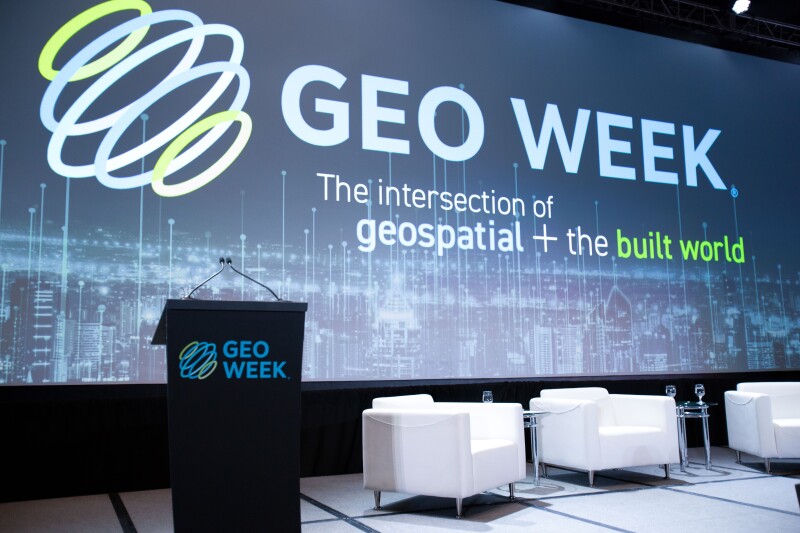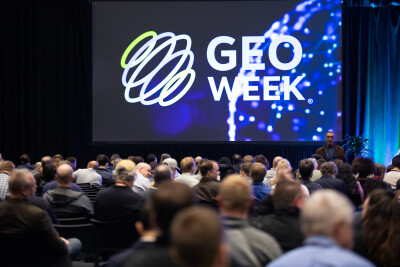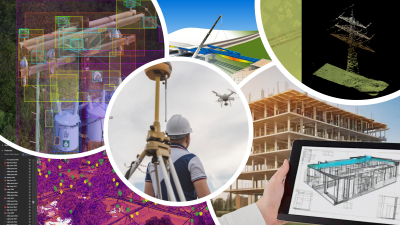With just over three months until the start of Geo Week 2025, the conference program is starting to take shape with experts and thought leaders from across the geospatial, 3D, and AEC sectors coming on board for what figures to be a packed and informative three days. It has been a busy year for the entire technology industry since we last met this past February, with developments around artificial intelligence as well as sensors bringing us into a new era for the geospatial and related industries. As a result, we’re anticipating to hear straight from the experts’ mouths just how the industry has changed and advanced over the previous 12 months.
As of this writing, the program is not finalized, but getting a sneak peek of some of the topics that will be included has the team at Geo Week News extremely excited about some of the discussions and presentations to come. Below, you can find three broad topics that we are anticipating will play a big role at this week’s Geo Week. If these excite you as well, don’t miss your opportunity to register for this year’s event, being held February 10-12 in Denver, Colorado.
Moving to “Phase Two”
Over the last decade or so, we’ve seen many industries – with AEC being among the most notable – embrace technology and digitization in a way that we hadn’t seen before, transforming workflows and streamlining inefficiencies that had plagued the sector. A lot of that revolved around testing out new tools and technologies and seeing what works the best. In many ways, this was the first phase of the technological adoption curve, and in looking through some of the topics that will be discussed at this year’s Geo Week conference, it appears we’re moving toward phase two.
In other words, you can expect to hear a lot more about, of course, some of the newest tools made available over the last year or so, but also how these and other technologies should be implemented. There will be, for example, discussions about the oft heard term “democratization of reality capture,” and what that really means for the industry. Experts will discuss what exactly this means and how organizations can take advantage of these more accessible tools, but also when it makes sense and – just as importantly – when it doesn’t.
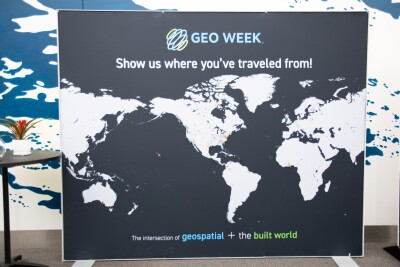
We’ll also hear a lot about how firms should be organizing their workflows in the wake of these new tools now becoming commonplace throughout the industry. BIM will be a big part of this discussion, with experts who have been utilizing this technology for years will share best practices for a variety of use cases, as well as common challenges professionals find in these workflows.
It’s not just the AEC industry that will be able to learn about how to move to the next stage of their technological adoption evolution. Surveying has generally been open to adopting new technology, but there is alway room to learn more about how to take your practices to the next level, which will be covered in this year’s event. Those working in 3D modeling will also be happy to hear that Geo Week will once again be covering the latest advances in that space as well, particularly as it applies to NeRFs and Gaussian Splats.
It’s one thing to be open to all of these new technologies, but the industry has been hearing about that initial phase for long enough. It’s time for the early adopters to move further along that evolution timeline, and Geo Week 2025 will be keen to hear from those who are already doing just that.
Enhancing Transportation
Transportation is a major topic of discussion for organizations and governments all across the world, with sustainability front of mind for everybody. All subsets within the transportation sector are looking to decrease their negative effects on the environment, and governments and other public agencies are trying to promote the most sustainable and efficient transportation systems for their areas. All of this, of course, requires – or is at least significantly assisted by – new modeling, monitoring, and planning technologies to make these transitions happen more smoothly.
Given this heavy focus all across the globe, it’s no surprise that it would appear to be a significant part of this year’s conference program for Geo Week. These talks should run the gamut in terms of technologies and tools being discussed, as well. For example, aging road infrastructure is a global problem with roads being more heavily used and reaching the end of their life cycles, and Geo Week will include speakers dealing with this very problem on hand to talk about how tools like mobile mapping systems, among others, will help transform road safety and maintenance.
Railways have also been a big part of any transportation discussion as localities try to further embrace this mode of transportation that provides greener alternatives than individuals driving their own cars. Geo Week will have an entire session dedicated to how digital twins and other tools are enhancing the monitoring and maintaining of these rail systems that are becoming a greater focus than they have been in decades.
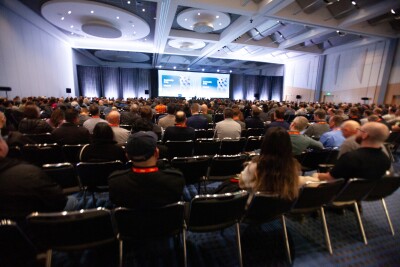
Taking Digital Twins to the Next Level
Over the last few years we’ve seen the idea of digital twins move from a buzzword to a tangible idea that has proven to bring value to asset and facility managers. We’ve seen plenty of examples at this point of projects benefiting from digital twins throughout the lifecycle, being leveraged from planning through construction and into operations. And in fact, this is a topic that has been covered extensively at past Geo Week conferences as well.
This year, we’re seeing another example of reaching a new phase or level, this time in the world of digital twins as they expand to larger scales. While this isn’t exactly a new concept in its own right, these large-scale digital twins – think entire cities or even nations as opposed to individual buildings or campuses – are becoming more common and accessible. Between advancements in artificial intelligence making it easier to work with large, complex datasets and new developments in sensors allowing for hybrid data collection with lidar and imagery from the air, it’s no longer a pipe dream to create these massive digital twins.
At Geo Week 2025, attendees can expect to hear from those who are doing just that, with sessions focused on the value these larger scale digital twins can provide as well as how they’ve gone about creating them. Industry experts will share best practices for collecting the data and all of the ways key insights can be gleaned from the digital twins.
These broad topics are just the tip of the iceberg in terms of what Geo Week 2025 will cover throughout the three-day conference program. Be sure to keep an eye out for further announcements about the program, and of course don’t miss your chance to register for this year’s event.


